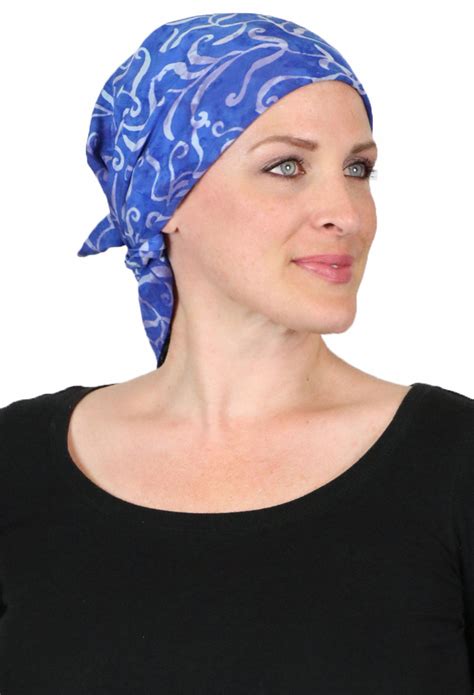Cancer affects millions of women worldwide, and many undergo treatments that result in hair loss, a significant but often overlooked aspect of cancer care. Head scarves provide solace, style, and empowerment for these women, allowing them to embrace their new appearance and feel beautiful amidst their medical journey.

Why Head Scarves Matter
Head scarves do more than cover hair loss. They:
- Restore dignity: Losing hair can be emotionally devastating. Head scarves help women regain a sense of control over their appearance and feel more dignified.
- Quell anxiety: Wearing a head scarf can reduce the stress and anxiety associated with the visible signs of cancer treatment.
- Foster confidence: Feeling comfortable and stylish in head scarves boosts women’s self-confidence, making them feel more empowered and positive.
- Protect delicate skin: Chemotherapy and radiation can make skin sensitive and vulnerable. Head scarves provide a protective layer, shielding the scalp from sun exposure and irritation.
- Facilitate social interaction: Head scarves can help women feel more confident in social situations, reducing the sense of self-consciousness that hair loss can bring.
Head Scarf Options for Every Need and Style
Choosing the right head scarf depends on individual needs and preferences. Here are key factors to consider:
- Materials: Cotton, silk, and bamboo are breathable and comfortable, while synthetic blends offer wrinkle-resistance and quick drying.
- Colors and patterns: Scarves come in a wide range of colors and patterns, allowing women to choose options that complement their complexion, outfit, or mood.
- Size and shape: Scarves vary in size and shape, ensuring a perfect fit for any head size or hair loss pattern.
- Security: Snap closures, Velcro, and ties ensure a secure and comfortable fit, even during daily activities.
- Special features: Some head scarves incorporate antimicrobial properties, moisture-wicking fabrics, or cooling panels for added comfort and protection.
Benefits of Wearing Head Scarves for Women with Cancer
- Improved psychological well-being: Head scarves have been shown to decrease anxiety and depression in women undergoing cancer treatment.
- Enhanced self-esteem: By allowing women to feel confident and stylish, head scarves boost their self-esteem and overall well-being.
- Medical benefits: Head scarves can protect sensitive skin from the elements and reduce friction against the scalp, minimizing discomfort during treatment.
- Community connection: Head scarves can create a sense of community among women with cancer, fostering support and shared experiences.
- Artistic expression: Head scarves offer an opportunity for self-expression, allowing women to explore their creativity and personal style even during challenging times.
Pros and Cons of Head Scarves
Pros:
- Comfort and style
- Increased confidence
- Medical benefits
- Community connection
- Artistic expression
Cons:
- Can be warm in hot weather
- May require frequent washing
- Can be challenging to tie or secure properly
Common Mistakes to Avoid with Head Scarves
- Not choosing the right size: A poorly fitting head scarf can be uncomfortable and less effective.
- Selecting inappropriate fabrics: Synthetic fabrics can irritate sensitive skin, while non-breathable materials can be uncomfortable in hot weather.
- Wearing head scarves too tightly: This can cause discomfort and migraines.
- Not washing head scarves regularly: Frequent washing keeps head scarves fresh and hygienic, especially during treatment.
- Ignoring the emotional significance: Head scarves should not be seen as just a fashion accessory; they can be a symbol of strength and self-acceptance.
4 Head Scarf Companies Making a Difference
- Love Your Melon: Donates 50% of profits to fight pediatric cancer.
- Malaya: Employs underprivileged women in India to sew head scarves, providing economic empowerment.
- Hope Scarves: Collaborates with cancer treatment centers to distribute free head scarves.
- Headbands of Hope: Partners with hospitals to offer style consultations and head scarf fittings for cancer patients.
Table 1: Head Scarf Materials and Their Benefits
| Material | Benefits |
|---|---|
| Cotton | Natural, breathable, comfortable |
| Silk | Luxurious, soft, temperature-regulating |
| Bamboo | Moisture-wicking, anti-odor, eco-friendly |
| Polyester | Wrinkle-resistant, quick-drying, budget-friendly |
| Lycra | Stretchy, lightweight, moisture-wicking |
Table 2: Head Scarf Sizes and Shapes
| Size | Shape |
|---|---|
| Petite | Small, covering only the top of the head |
| Medium | Average size, covering most of the head |
| Large | Full coverage, including the neck |
| X-Large | Oversized, designed for long or thick hair |
| Square | Versatile, can be folded or tied in various ways |
| Rectangular | Long, flowing, can be draped or wrapped |
| Pre-tied | Convenient, easy to put on and take off |
Table 3: Head Scarf Security Options
| Type | Benefits |
|---|---|
| Snap closures | Quick and secure, easy to adjust |
| Velcro | Adjustable, provides a comfortable and tight fit |
| Ties | Traditional, allows for a customizable fit |
| Elastic | Stretchy, provides a comfortable and secure fit without tying |
| Grips | Adhesive strips that hold the scarf in place without additional closures |
Table 4: Special Features of Head Scarves
| Feature | Benefits |
|---|---|
| Antimicrobial | Protects against germs and bacteria |
| Moisture-wicking | Absorbs sweat and keeps the head cool and dry |
| Cooling panels | Regulates body temperature, especially during hot weather |
| UV protection | Shields the scalp from harmful sunlight |
| Odor-resistant | Prevents unpleasant odors, especially when used during intense activities |
Head Scarves: A Symbol of Strength, Beauty, and Empowerment
Head scarves for women with cancer are more than just a fashion accessory. They represent strength, beauty, and empowerment during a challenging time in their lives. Choosing the right head scarf and wearing it with confidence can uplift their spirits, enhance their well-being, and help them celebrate their individuality and resilience.
